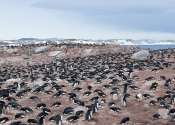Deep-sea volcanoes: Windows into the subsurface
Hydrothermally-active submarine volcanoes account for much of Earth's volcanism and are mineral-rich biological hotspots, yet very little is known about the dynamics of microbial diversity in these systems. This week in PNAS, ...









